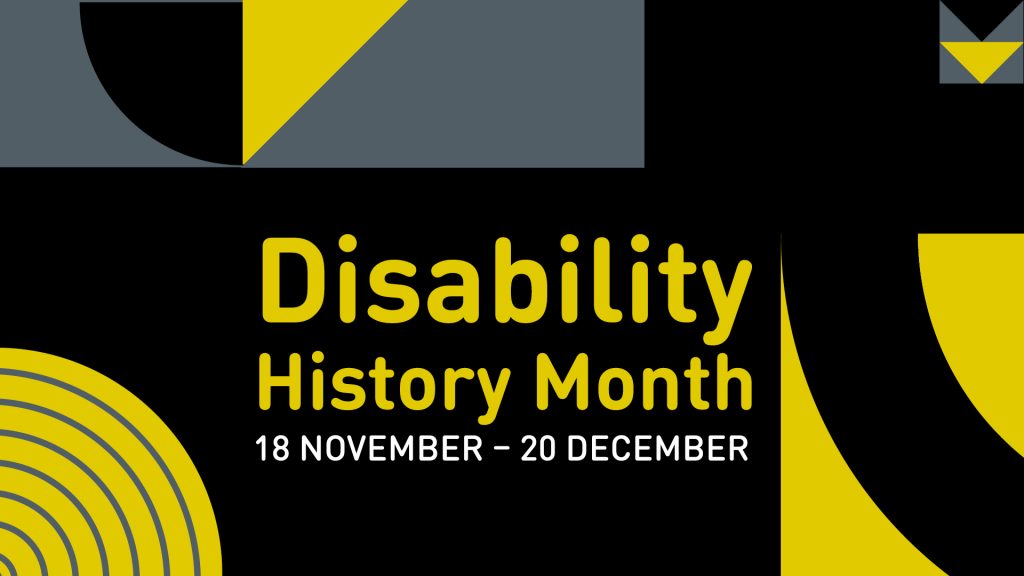Disability, Me and the Inclusivity Group

Chair of the Inclusivity Group and Postgraduate Administrator, Emma Nadin, shares her experiences as part of the University’s campaign to raise awareness for UK Disability History Month.
I was identified as having dyslexia in 2017 after undertaking an assessment process with an independent company which was supported by my Operations Manger at the time.
Not long after this, my eldest son was diagnosed with ADHD and dyslexia. From this moment on it was clear that neurodiversity was to play a huge part as a fifth member of our family.
At work I began to explore how I could get support for my dyslexia and I realised that I needed to declare it to the University through my.HR. A notification of my declaration was automatically sent to Occupational Health and a few days later I received an email asking whether this had an impact on your work duties and, if so, would I like a consultation with the Occupational Health Adviser to discuss this?
Did I? I had managed my dyslexia for most of my working life without even knowing it. I replied to say that I was happy with my current working environment and I had strategies in place. I was informed that the Employee Assistant Programme was available if I felt I needed support.
I was intrigued though; I knew there was so much support for students with neurodivergent profiles, so I searched on the University website for support for staff with dyslexia. The only pages that I could find were student related. I was directed to a page on the Human Resources and Organisational Development (HROD) website which had information about *Access to Work (a Government scheme that provides practical help to overcome the barriers that people with disabilities experience in the workplace).
However, I could not find anything about specific support for ADHD, Dysxpraxia or Autism. So, this got me thinking about what support there was available for invisible disabilities.
I don’t have a physical disability, mine is classed as an invisible disability, a neurodiverse profile. Back then, I felt that I didn’t fit into the Staff Disability Group and wondered what I could offer the group; but I joined as I wanted to have the opportunity to speak about things that affected me and to receive support.
After meetings with the Vice-Chancellor and the previous Chair of the Disability Group, I took over the role as Chair of the group in July 2019 .
After consultation with other members, the Disability Group was relaunched as the Inclusivity Group. The decision to rename the group was not taken lightly, but we felt that changing the name made it feel more inclusive of all disabilities. We wanted to make sure we were an open group, that people like myself felt that they could join, get involved, and have a voice.
The group is open to not only those who have disabilities, but also by those who are affected by them. This was because we wanted it to be a group that could support parents and carers who may not have a disability themselves but provide care to someone who does. For example, some of my home challenges when looking after my eldest son have a bigger emotional impact on my working life than my own disability. We offer support in the form of fortnightly team meetings at the moment, but we also have a MS Teams chat open should anyone want to get in touch at anytime.
Moving forward the Inclusivity Group goes from strength to strength. We are an independent group not reporting to but working closely with HROD to ensure that disability inclusivity remains prominently on the agenda. The group is very active and is currently working with HROD with regard to the EDI process across the University, and we are also reviewing the University’s commitment to **Disability Confident.
Over the last few months, the group has been working closely with the University to resolve the issue of those who are unable to wear face coverings on campus. We have also worked with FM to ensure that all members of the group are made aware of any building works that may affect their movement around campus.
More information about what the University is doing for Disability History Month can be found on the dedicated webpage.
Any member of staff who identifies as having or being affected by physical or invisible differences (including those who support or care for others) is welcome to join the Inclusivity Group. For more information, please contact Emma Nadin by emailing e.l.nadin@lboro.ac.uk
*Access to Work is a Government designed scheme that provides practical help to overcome the barriers that disabled people experience in the workplace. You may not define yourself as disabled, however, if you have an impairment that restricts your ability to carry out your job then you may wish to consider this.
** Disability Confident is a government scheme designed to encourage employers to recruit and retain disabled people and those with health conditions. It has replaced the previous Two Ticks Positive About Disabled People scheme. It is voluntary and has been developed by employers and disabled people’s representatives.
Health and Wellbeing
Wellbeing means being in a positive physical, social and mental state. Wellbeing is important to us as happy, healthy people who achieve harmony in their work / life mix are more creative, productive and help to create a great place to work.